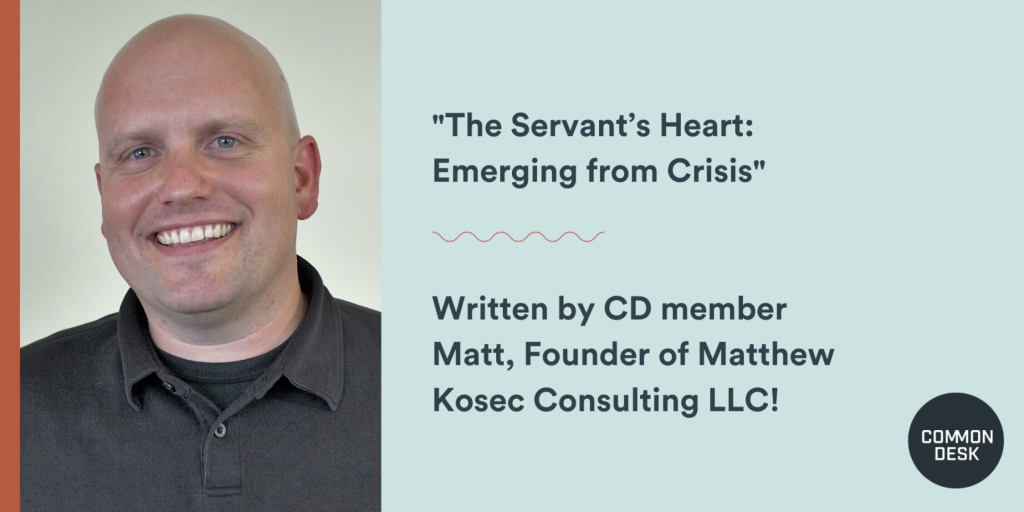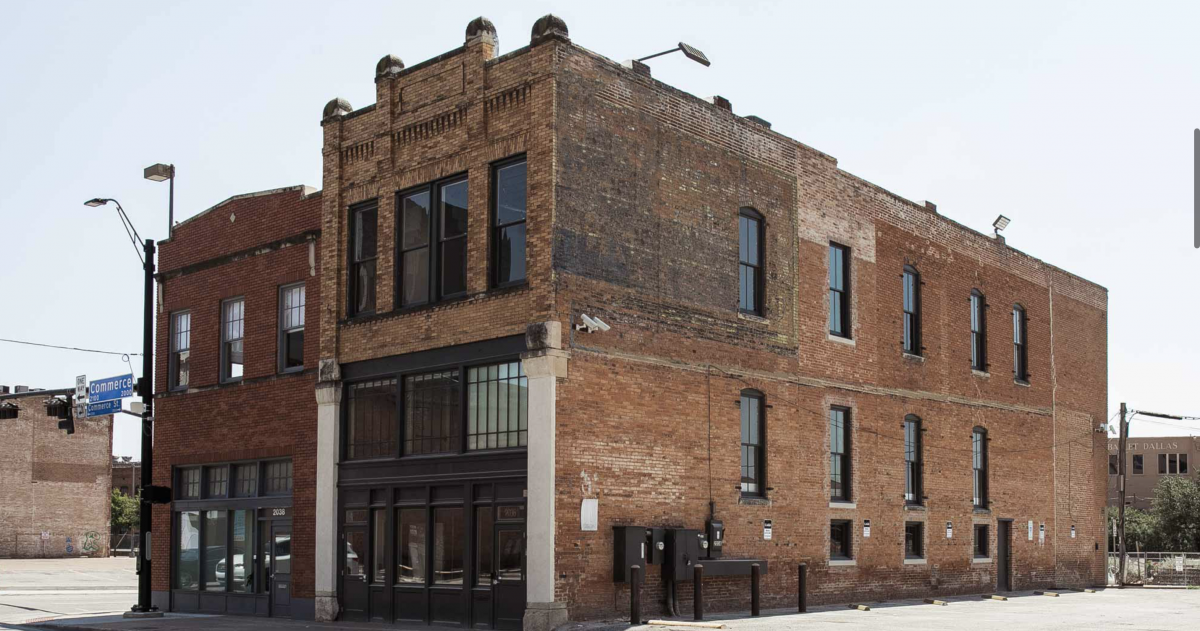We’re excited to share another member-written article with you! Meet Matt, one of our long-time members at Common Desk – Granite Park in Plano. Matt spends his days coaching businesses on how to be better leaders. He’s shared a thoughtful write-up on something we can all benefit from hearing: having a servant’s heart in a time of crisis. Pro tip: read this with a pen and paper close by, because you’ll want to remember these words of wisdom:

It is likely the COVID-19 pandemic has plunged you and your organization into a crisis you’ll never forget. For-profit companies are facing suddenly bleak financial outlooks. Non-profits are confronted with a dangerous combination of a lack of funding and expanded expectations. Start-ups that mere weeks ago held bright futures may now be questioning whether there even is a future. Governing bodies and leaders are challenged in stunningly new ways and there’s little historical playbook to consult. Few, if any, individuals, companies, and organizations will not feel some sort of impact.
Most leaders recognize that extraordinary measures are required. Individuals at all organizational levels, from CEO to front-line employees, are jumping into fundamental crisis management mode. Although it may be necessary, it isn’t how well we manage that defines each of us and our organizations during a crisis.
In the long run, leadership actions will define if and how organizations emerge from this pandemic.
- Actions by leaders who understand that their greatest leadership potential will be found through acts of service.
- Actions by leaders who view themselves as stewards of the human beings who are the organization.
- Actions by leaders who genuinely care first about the welfare of their individual people, then company results.
- Actions by leaders who work tirelessly at creating a culture of care and service, whether times are good or bad–recognizing another crisis will arrive someday.
- Actions by leaders who author Robert K. Greenleaf described as “servant leaders.”
Most importantly, while “crisis management” tends to be reserved for managers, directors, and executives, the servant-leaders I’m referring to include anyone in the organization. While a crisis may quickly expose management incompetency, it can also beautifully reveal powerful, highly-effective leadership from the individual contributors on the front-line level.
Whether servant leadership has been at your core for decades or is new to you, here are three vital steps to practicing servant leadership to help you and your organization emerge from crisis.
Step 1: Show Genuine Care for People
I’ve worked with and for an array of leaders. Many of them I admire and respect greatly. There have been some I don’t, and that’s mainly because they didn’t demonstrate a genuine care for people.
“Demonstrate” is a key word here. Indeed, I’ve worked with a few leaders who simply didn’t care about their people, viewing them as a cog in the machine. More often, though, it wasn’t because the leader simply didn’t care about people; it was because they didn’t show it.
During smooth times we can easily become wrapped up in the work: heads down in a new project, tied up with expansion of new business lines, busy with fundraising, or constantly watching the bottom line of the profit and loss statement. Any of us can quickly forget that none of these are possible without the human beings behind them.
A crisis like COVID-19 can amplify our intense focus on the work. We can convince ourselves that being “heads down” in the details of crisis management is the only path to staying afloat. A monthly financial forecast meeting is now weekly. Timelines on decisions become quick, and the external environment is changing rapidly. The most noble of us–those serving on the front line of healthcare–face extraordinarily long shifts. Fear and uncertainty can, and often should, drive us to work harder.
At the same time, there’s a swift undercurrent in the COVID-19 crisis–one that stirs deep, powerful emotions. Frightening feelings from past experiences, such as having lost a job during the great recession, can vibrantly return. Deep fears around our loved ones, or even ourselves, becoming infected come to the surface.
Not to mention the impact on personal lives. Many of us are cast into physical separation. Or, a personal life that is full of sudden, extreme closeness, such as families in quarantine and parents performing the role of employee and teacher.
No doubt, emerging from this pandemic will require the grinding work of crisis management.
But, at the same time when we’re at the greatest risk of being fully submerged in the work of crisis management, we need authentic and vulnerable leadership from each other the most. In this highly emotional state, hearing that we matter and that our leaders care for us means more than ever.
The best servant leaders among us appreciate that while a crisis demands hard work from everyone, now is the time for more human connection, not less. We can’t get so obsessed with holding the organization together that we forget the people…who need support, connection and love…make up the organization.
Now’s the time to communicate with your organization’s human beings more than ever. If you care about them, tell them. If you’re afraid for their financial future, be honest with them. If you’re confident about tomorrow, tell them why.
As Ken Blanchard and Colleen Barrett wrote in Lead with LUV, “People admire your strengths, but they respect your honesty regarding your vulnerability.”
During a crisis, don’t run away from vulnerability…step into it.
Step 2: Show Your Values Matter
Most organizations have a set of values posted on a website, emblazoned on the walls of a corporate headquarters, or embedded in a new hire orientation powerpoint. Fewer organizations incorporate values to a level where most employees can describe them.
I’ve only encountered one company whose values are so ingrained in their culture that they speak directly about them in a daily all-hands meeting.
Practicing values requires far more effort, courage, and diligence than mere declaration and posting on a wall. Values are aspirational, and they only mean something once they’re enacted through leadership behaviors at all levels of the organization. Customers and clients are becoming more in tune with whether an organization is aligned with stated values. As Simon Sinek stated in Start with Why, “People don’t buy what you do, they buy why you do it.”
During a crisis, leaders are faced with tough decisions with less data and on tighter timelines. They are challenged to communicate internally and externally in new ways. Financial projections and models become less reliable. The very “what they do” can be changed in an instant, such as a cruise ship converted to a life-saving rescue mission.
Navigating this environment will be near impossible without leadership behaviors that are based upon declared and practiced values. In fact, if values and behaviors are severely misaligned, a crisis may just shine a bright spotlight for everyone to see the inconsistency. After all, Enron had clearly stated values of communication, respect, integrity, and excellence, but their story revealed the values weren’t always practiced.
On the other hand, a crisis also offers the opportunity to let your personal and organizational value alignment shine. Consider, for example, how Dallas-based coworking provider Common Desk has responded to the massive financial strain created by COVID-19. In a message to members, Common Desk founder Nick Clark called out the company’s mission, “To enhance every workday by creating thoughtful moments, human connections, and a sense of belonging-for all.” Notice this mission doesn’t say anything about renting office space. Sure, they do that, but why they do is a far more noble aspiration.
It is why Common Desk exists…their mission…that will help them successfully navigate the COVID-19 crisis. When your mission is aimed at higher values, a crisis can become an opportunity to double-down on what is most important.
Nick Clark did just that when writing to members: “We have no intentions of backing away from our mission now.” Clark and his team quickly offered a “Work from Home,” donation-based membership. While other coworking companies struggle with renting office space in this crisis, Common Desk is connecting with potentially new customers who find themselves abruptly working from home.
Sticking to values isn’t just the work of lofty company mission statements. Your values as an individual and leader are also on display during a crisis. What you stand for, what matters to you, and how you treat others will be tested. If you wait for a crisis to be underway to clearly define and demonstrate your personal leadership values, you’ll never stand a chance of being respected and followed.
Defining who you are as a leader is a daily, long-term discipline. A crisis becomes the opportunity to let your values shine in service of others.
Step 3: Crisis Leadership Is an Ongoing Practice
In a recent letter to shareholders, J.P. Morgan Chase CEO Jamie Dimon wrote, “Entering into a crisis is not the time to figure out what you want to be. You must already be a well-functioning organization prepared to rapidly mobilize your resources, take your losses, and survive another day for the good of all your stakeholders.”
“Crisis Management” is a deceptive and dangerous term. It connotes that we’re presented with a crisis, there’s a set of management tools we can apply, and then, after managing away the crisis, we can all return to a calm and resting normal.
The best crisis leadership occurs long before the actual crisis. It takes time to build organizational cultures that activate values, show consistent care and love for the people who make up the organization, and create loyalty and commitment from the heart.
Servant leaders practice foresight, recognizing that every single day is the best day to build a culture of grit and resilience. Every single day is the best day to connect and show vulnerability with others. Every single day is the best day to declare and demonstrate your leadership values.
Consider the leader who rarely emerges from the office, infrequently shares information, and sees people as a means to an end. As the pandemic arrives, they decide it is time to emerge from their office with their best motivational speech, aimed at rallying the troops into crisis management. At best, this “leader” will win the hands of employees for a while. The problem is a crisis of this size requires far more than everyone’s hands.
It requires heart.
Heart inspires people to commit to reduced pay or furloughs so the company can have a chance at surviving. It takes heart for executives to forgo some or all of their salaries. It is heart that inspires service to those in need, even when one’s own future is uncertain. Customers and clients are especially in tune with demonstration of heart during a crisis. It is quite possible that how a company shows heart will guide post-crisis customer spending decisions.
During a recent conversation with a colleague, the impact of COVID-19 on the airline industry came up. He remarked how impressed he was with Southwest Airlines CEO Gary Kelly’s communication. It seemed Kelly was having an open, vulnerable, and honest conversation with every one of Southwest’s 60,000-plus employees. He wondered how Kelly was able to build so much momentum and trust in the middle of a crisis.
I suggested that Gary Kelly hadn’t. He’d built it over decades. The communication, candor, and connection are routine, ongoing practices. The current environment creates some exigency and amplification, but the pattern had long been established. In Stephen Covey’s terms, the “trust bank” was being cashed in.
When a crisis like COVID-19 strikes, the best leaders recognize that the fundamentals of crisis management need to kick in, but in the long-term, the pandemic is really a report card on how well the organization has built a culture of service and leadership that engages the heart.
Few, if any, companies and organizations will be unscathed by the COVID-19 pandemic. As each of us emerge, I hope we rebuild organizations that do even more to encourage the servant’s heart and value the beautifully imperfect, vital human beings who are the organization.
As founder of Matthew Kosec Consulting LLC, Matt pursues his personal mission of helping build as many organizations as possible where he’d be proud of his kids to work by delivering servant leadership focused seminars, leading organizational change initiatives, and individual coaching. Learn more at matthewkosec.com or contact at matt@matthewkosec.com
Disclaimer: While Matthew Kosec is a loyal customer and raving fan of Common Desk and Southwest Airlines, he’s received no compensation or benefit for the content contained herein.

















